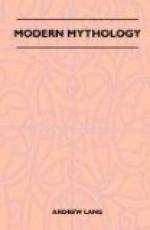It is with no enthusiasm that I take the opportunity of Mr. Max Muller’s reply to me ‘by name.’ Since Myth, Ritual, and Religion (now out of print, but accessible in the French of M. Marillier) was published, ten years ago, I have left mythology alone. The general method there adopted has been applied in a much more erudite work by Mr. Frazer, The Golden Bough, by Mr. Farnell in Cults of the Greek States, by Mr. Jevons in his Introduction to the History of Religion, by Miss Harrison in explanations of Greek ritual, by Mr. Hartland in The Legend of Perseus, and doubtless by many other writers. How much they excel me in erudition may be seen by comparing Mr. Farnell’s passage on the Bear Artemis {0e} with the section on her in this volume.
Mr. Max Muller observes that ’Mannhardt’s mythological researches have never been fashionable.’ They are now very much in fashion; they greatly inspire Mr. Frazer and Mr. Farnell. ’They seemed to me, and still seem to me, too exclusive,’ says Mr. Max Muller. {0f} Mannhardt in his second period was indeed chiefly concerned with myths connected, as he held, with agriculture and with tree-worship. Mr. Max Muller, too, has been thought ‘exclusive’—’as teaching,’ he complains, ’that the whole of mythology is solar.’ That reproach arose, he says, because ’some of my earliest contributions to comparative mythology were devoted exclusively to the special subject of solar myths.’ {0g} But Mr. Max Muller also mentions his own complaints, of ’the omnipresent sun and the inevitable dawn appearing in ever so many disguises.’
Did they really appear? Were the myths, say the myths of Daphne, really solar? That is precisely what we hesitate to accept. In the same way Mannhardt’s preoccupation with vegetable myths has tended, I think, to make many of his followers ascribe vegetable origins to myths and gods, where the real origin is perhaps for ever lost. The corn-spirit starts up in most unexpected places. Mr. Frazer, Mannhardt’s disciple, is very severe on solar theories of Osiris, and connects that god with the corn-spirit. But Mannhardt did not go so far. Mannhardt thought that the myth of Osiris was solar. To my thinking, these resolutions of myths into this or that original source—solar, nocturnal, vegetable, or what not—are often very perilous. A myth so extremely composite as that of Osiris must be a stream flowing from many springs, and, as in the case of certain rivers, it is difficult or impossible to say which is the real fountain-head.
One would respectfully recommend to young mythologists great reserve in their hypotheses of origins. All this, of course, is the familiar thought of writers like Mr. Frazer and Mr. Farnell, but a tendency to seek for exclusively vegetable origins of gods is to be observed in some of the most recent speculations. I well know that I myself am apt to press a theory of totems too far, and in the following pages I suggest




